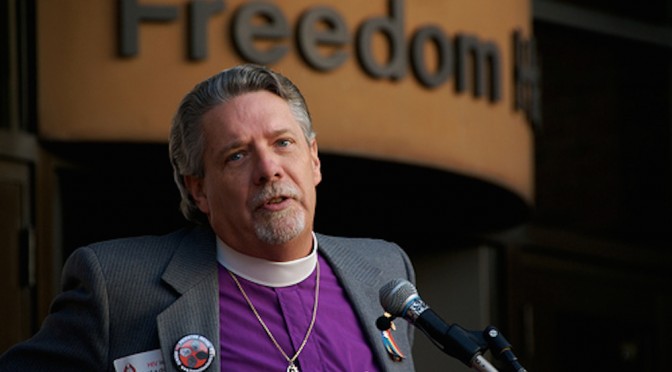
Remember the Arab Spring? Fueled by social media, the people of several Arab nations started taking to the streets five years ago to demand a different way of life, a change in the relationship they have with their governments. Now granted, the Egypt, Libya and Syria of today may not look exactly like what we might have expected as a result of the protests – but if we look at our own history in America we can see that, as Martin Luther King Jr. said, its arc is long but does indeed bend toward justice.
So we need the Arab Springs, and the long hot summers of discontent — but they’re just the beginning.
And then there are the moments when that arc toward justice takes a tremendous leap, like today, when the U.S. Supreme Court ruled that marriage equality will be the law of the land, from sea to shining sea.
But looking at the full breadth of the nation under that arc today, we see a nation that in some corners really struggles with something so basic as the exact place the Confederate battle flag should occupy in the public eye. We see a nation that is morning the deaths of nine churchgoers in Charleston, S.C.
We see a nation that is not only wounded by the deaths of Michael Brown and Freddie Gray, but that has rioted in response.
Freddie Gray, you’ll recall, is the young man in Baltimore who suffered spinal injuries in the back of a police van – a “rough ride” tactic that reminds me of what happened to Stephen Biko when he fell ill in prison. The difference between the two being that Stephen Biko was imprisoned in apartheid South Africa, a regime notorious for its brutality toward black Africans. A racist regime.
Baltimore may not be struggling with the issue of Confederate battle flag displays, but clearly something is at work in Baltimore that’s hard to characterize as anything but racism.
I bring this up because societal equality for African Americans has been trying to happen for the better part of a century and a half. The truly intentionally legislated and adjudicated version of that equality really took flight five decades ago. Yet the average black person in America is hardly flying, whether it’s socioeconomically or just emotionally. The struggle for equality is just that: A struggle.
Not that it should be. But for us, for some reason, it just is.
For same-gender-loving people, marriage equality marks the real beginning of the end of second-class citizenship. But it’s truly just the beginning. Because those same two men or two women who marry legally can still, in far too many states, be fired just for being who they are. Nor does the adoption landscape look the same state-by-state.
And if either party is transgender, they may very likely live in a state where their true gender is misrepresented on their state-issued identification, or where “potty police” would like to legally dictate what bathrooms they can use. But not being forced to be a legal stranger to your life partner is a nice thing to have in a society where the building of a family is a fundamental building block.
Marriage equality also will not be some sort of magic shield that suddenly obviates gay-bashing or makes coming out in rural America a cakewalk.
And this is to say nothing of backlash, which is a real thing. Or of the really long road that still lies ahead for transgender people, who experience homelessness, desperation, violence and even death at the hands of a society in which gender is clearly the third rail of self-expression.
There have been riots in Ferguson, Baltimore and other cities in America over police mistreatment of people of color.
There was also a riot in New York City; it happened on a hot June night when a group of gay, lesbian and transgender bar patrons decided they’d had enough with police tactics against them – and enough with being a despised minority exploited by the mafia, shamed by the media, and diagnosed mentally ill by the medical profession – and would not go gently into the police paddy wagons as they’d done so many times before.
So they rioted. And the riot went on for several nights, and grew, and attracted allies. The first night of that riot was June 28, 1969 – and the first anniversary of that riot became the first date that LGBT pride parades began happening in cities in America – and then around the world.
In other words, what we now recognize as the modern LGBT rights movement literally started with that night. It started with a riot. It is bookended by the legal and social struggles of African Americans, who now rightly question the official and societal attitudes that are literally costing people their lives.
So we’re apparently on parallel tracks, moving toward that eventual day when we can think about thriving instead of just surviving. We’re on that arc, moving toward justice. We’ve rioted, but separately. And my question to you is, when will we see ourselves as being on the same arc? Could there ever be an American Spring where we connect the dots, join arms and march forward, not in parallel but truly together?
If we want to live out the true meaning of our American creed, I don’t think that’s an option. It’s an imperative.